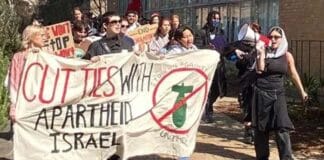As the horror of Israel’s genocidal war in Gaza has grown, the clearer has become the depth and intimacy of the Australian ruling class’s military connections with the Zionist entity, built up over many years.
In late January, ABC News revealed that the Victorian State Labor government had signed a secret Memorandum of Understanding (MoU) with Israel’s Defence Department in December 2022.
A Victorian government spokesperson’s response was, “As Australia’s advanced manufacturing capital, we are always exploring economic and trade opportunities for our state.”
Now the Guardian has revealed an even more cynical side to the deal—an explicit desire to make profits from the growing danger of war.
The MoU states: “Globally countries are investing significant funds to protect their national interests with military capabilities aligned to this environment.
“This MoU is a pathway for meaningful cooperation between Israel and the state of Victoria to capture and share these opportunities.”
Mayhem
In March 2023, then Industry Minister Ben Carroll, now the Victorian Minister of Education and Deputy Premier, visited Israel to build on the momentum of the MoU and to lobby Israel Aerospace Industries (IAI), Elbit and Rafael to deepen their existing investments in Victoria. These latter two arms-makers also already have offices in Melbourne.
Early this year, in the midst of the mayhem, destruction and utter carnage that Israel has rained on Gaza, the federal Labor government agreed a contract with Elbit worth $917 million for the manufacture of weapons in Australia.
Another new Israeli player is Plasan Sasa, which already collaborates with Thales, a French arms-maker with a portfolio of significant military-sector investments in Australia.
It also works with British-owned BAE Systems Australia and Australian-owned Bisalloy metals based in Wollongong, NSW.
IAI has a joint venture with NIOA, of Queensland, the biggest Australian-owned supplier of military munitions, to manufacture missiles as the Australian Missile Corporation.
The owner of NIOA, Robert Nioa, stepped out of the shadows in early December 2023 to speak at the National Press Club in Canberra to call for a “defence industry action and plan” and for further federal government purchases from local military manufacturers like his.
Not that the Albanese government needs any prodding to further militarise the Australian economy and society.
In September 2023, Anthony Albanese visited the Rafael Varley factory, in Newcastle. This joint venture between Israel’s Rafael Advanced Weapons Systems and the local Varley engineering company is also making missiles.
In the outer-northern Melbourne suburb of Campbellfield, the pro-Palestinian movement has successfully blockaded on occasions a metals manufacturer—HTA—which make parts for the F-35 fighter bomber, which the US-owned Lockheed Martin sells to Israel.
There is a similar campaign under way against another Melbourne manufacturer of parts for war planes, at AW Bell in Dandenong South.
Mass destruction
Lockheed Martin has had its own MoU with the University of Melbourne since 2013 to use its science and technology to research further weapons of mass destruction to sell to Israel, among others.
Another addition to the University of Melbourne’s suite of arms-makers is Leonardo S.p.A., in which the Italian government has a 30 per cent stake. It, too, sells weapons to Israel.
It’s clear that a thousand threads link Australian capital to Israeli capital, as the Australian ruling class sets itself the goal of being in the world’s top 10 of arm exporters.
Ben Carroll, Victoria’s Deputy Premier, unashamedly reported that the state wanted access to Israel’s “early stage venture capital funds”.
The breadth and scale of those Australian connections to Israeli capital demands a force of even more power to overcome it. That power is unionised workers.
Blocking one weapons parts factory or one ship from the Israeli line, Zim, is a great start but it is clearly not enough to stop our own ruling class’s long-term support for Israel.
In the fight against the Vietnam War and South African apartheid it was workers’ industrial action that cut trade. Action inside the factories that produce the weapons’ parts is far more effective than being outside the gates, at the mercy of police repression.
However, since the introduction of enterprise bargaining, successive governments have enforced anti-strike laws that make political strikes illegal. To place bans on goods bound for Israel, workers would have to have to break the existing anti-strike laws.
The Palestine movement is not yet big enough to give workers the confidence to break the anti-strike laws. But the movement is big enough to begin to consciously work to build connections with the unions and rank-and-file workers who have the power to break Australian capitalism’s connection to Israel.
By Tom Orsag






